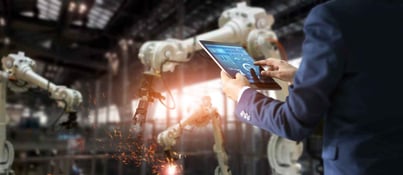Artificial Intelligent (AI), it continues to make waves in almost all sectors. What is clear is that AI is not a fad that will disappear. There is sufficient evidence that it will continue to revolutionize our world. Positive changes are on the horizon as we traverse 2024-25. 
There are many reasons why manufacturing companies continue to adopt AI. AI facilitates operational efficiency through task automation, aids in cost-effective predictive maintenance, improves product quality, reduces costs, and increases supply chain optimization. AI's transformative capabilities ensure competitiveness, efficiency, and innovation in the dynamic manufacturing landscape.
Predictions for Implementing AI in Manufacturing
As Vishal Supekar, Data Science Manager Generative AI - Accenture - Artificial Intelligence - NLP Fellow, comments:
- By 2025, AI-powered automation will transform manufacturing. AI-driven robots will handle repetitive and risky tasks, thus boosting efficiency and safety.
- Predictive maintenance, thanks to AI, will reduce downtime and save costs.
- AI will enable large-scale product customization to meet individual customer needs efficiently.
- Supply chains will gain resilience through improved demand forecasting.
- AI-driven logistics will reduce waste and environmental impact.
This shift marks a significant move toward a streamlined, sustainable, and customer-centric manufacturing process.
Predictions in Stats
According to Yuliia Kniazieva, Editor-at-Large at Label Your Data, AI is expected to add $15.7 trillion to manufacturing by 2025.
In 2019, the global use of AI in the manufacturing market was $1.82 billion, which is set to reach $9.89 billion by 2027, with a projected annual growth rate of 24.2% by 2028.
6 Use Cases for AI in Manufacturing
#1 Collaborative Bots (Cobots)
Cobots, short for collaborative robots, are newer robots designed to work safely with humans in factories. Unlike regular robots, cobots are cost-effective and don't need unique spaces or barriers. They can do tasks like picking items, manufacturing operations, and quality control checks using cameras.
Big car manufacturers, like BMW and Ford, use cobots for tasks such as gluing and welding. In consumer goods, companies like Procter & Gamble use cobots to make assembling and packaging more accessible and efficient. The name "cobot" comes from their collaborative nature, working alongside humans without any safety concerns.
#2 Predictive Analytics, Artificial Intelligence (AI) and The Supply Chain
In manufacturing, AI is transforming supply chain management. It enhances its efficiency, accuracy, and cost-effectiveness. It enables predictive analytics, optimizes inventory management, and streamlines logistics. For example, Amazon uses AI to speed up deliveries and improve customer satisfaction.
Machine Learning (ML) involves analyzing historical data for accurate demand predictions. An automotive parts manufacturer can optimize inventory and reduce costs by forecasting spare parts demand.
AI-driven solutions in manufacturing optimize supply chain networks, lower transportation costs, ensure timely deliveries, and elevate customer satisfaction. The integration of AI is reshaping how supply chain management operates in manufacturing.
#3 Digital Twin in Complex Machinery
Digital twins are virtual copies of real things, helping companies understand complex machinery better. They use smart sensors on the object, like an airplane engine, to send information to its virtual twin.
With the help of AI and other technologies, this digital twin provides a deeper understanding of the object. Companies can monitor the object throughout its life, receiving important alerts for inspections and maintenance.
Examples of Digital Twins in Manufacturing
For example, sensors on an airplane engine send data to its digital twin every time the plane takes off or lands. This gives the airline and manufacturer crucial information about how the engine is performing. The airline can use this data to simulate situations and predict potential issues.
Digital twins in manufacturing, like for a production line robot, create a virtual version that mirrors the real thing. The digital twin allows companies to monitor real-time performance using robot sensors' data.
Alerts for maintenance are triggered if any issues arise. This helps optimize the robot's efficiency and prevent breakdowns throughout its operational life.
#4 Robotics Process Automation RPA
While cobots work on the production floor in manufacturing, another helpful technology, Robotic Process Automation (RPA) software, plays a vital role in the back office. RPA software is designed for tasks like managing large volumes of work, handling repetitive jobs, and efficiently managing data across different systems.
One key advantage of RPA is its ability to automate tasks such as order processing. Doing so eliminates the need for manual data entry, reduces the chances of errors, and saves time. This streamlines processes and helps avoid the time-consuming task of fixing input errors.
Furthermore, RPA proves valuable in dealing with server issues and downtime. In the face of such challenges, RPA can take charge by rebooting and reconfiguring servers. This capability contributes to lower IT operational costs, showcasing RPA as a versatile solution for enhancing efficiency and addressing technical disruptions.
#5 Lights Out Factories: A Cost-Efficient Opportunity
Lights-out factories, a unique AI manufacturing concept, rely entirely on robots and advanced technologies. These factories operate with minimal human involvement, presenting a potential cost-saving opportunity for manufacturers.
Robotic workers in lights-out factories don't share the exact needs of humans. For instance, they don't require lighting or environmental controls like air conditioning and heating. Manufacturers can save money by adjusting or minimizing these services.
Unlike human workers, robotic counterparts in lights-out factories can work around the clock without fatigue or illness. They have the potential to produce more products with potentially fewer errors, offering manufacturers an efficient and cost-effective solution.
#6 AI and Inventory Management
Inventory management is integral to avoiding slowdowns in manufacturing processes, and some companies are turning to AI for assistance.
AI systems effectively monitor supplies and provide timely alerts for replenishment, helping manufacturers stay well-stocked. Additionally, companies can program AI to identify potential bottlenecks in the supply chain specific to their industry.
Suppose a car manufacturer relies on a unique paint color with a limited supply. AI can analyze historical data, supplier performance, and external factors to forecast paint availability. This ensures that the manufacturer can address potential shortages and maintain a smooth production flow.
Alpha Software: Pioneering AI-Infused Solutions for Manufacturing Quality Teams
Alpha Software's manufacturing solutions adapt rapidly to a manufacturer's unique processes, tying into existing Manufacturing Execution (MES) or Enterprise Resource Planning (ERP) systems or crafting advanced solutions with rapid implementation.
How To Video: Using ChatGPT to Build Intelligent Digitial Forms
In fact, VP of Product Marketing Dave McCormick recently produced a video showing how an Alpha Software customer - Robin Bennet of Start Software - is already using ChatGPT to product digital forms using Alpha TransForm. Dave then walks viewers through the exact process of using ChatGPT to digitize a form, generating code and bringing it directly into Alpha Transform no-code app builder. He then offers an example of how to quickly create a digital form for the new Federal regulation Section 1.1330, around grocery delivery and traceability. Watch how AI can dramatically speed the creation of intelligent digital form designs. Click below to watch the video:
Gemba Walk 2023 App:
Alpha Software's Gemba Walk mobile app lets factory management observe work processes on-site, utilizing digital checklists and tailored questions for continuous improvement more accurately and quickly than paper-based processes.
Digital transformation through mobile forms enhances data capture, transparency, and collaboration, which fosters efficient operations, minimizes waste, and promotes worker-management relationships.
5S Audit Checklist 2023 App
The Alpha TransForm 5S Audit Solution facilitates systematic 5S Audits and supports continuous improvement efforts. This app can provide real-time monitoring, streamlined data collection, and efficient analysis, empowering organizations to achieve their goals and optimize their operations.
Boosted Efficiency Through AI and Digital Transformation
With the manufacturing industry facing a potential shortage of 2.4 million jobs by 2028, Alpha Software solutions combined with AI can empower companies to accomplish more with less. Companies can utilize fewer workers as Alpha Software solutions streamline data collection and analysis, reduce task time, and enhance overall efficiency.
Customer Success: Igloo Case Study
Quality Manufacturing Solution for Igloo Cooler:
 Igloo used Alpha Transform to digitize quality control processes instead of over-relying on time-consuming, error-prone paper-based processes. This resulted in monthly cost savings of $145,000 and heightened accuracy.
Igloo used Alpha Transform to digitize quality control processes instead of over-relying on time-consuming, error-prone paper-based processes. This resulted in monthly cost savings of $145,000 and heightened accuracy.
The Texas-based company, a pioneer in manufacturing excellence, transitioned from paper to digital audits using Alpha Transform's no-code app builder.
The digitized forms enabled seamless data capture, cloud storage integration, and enhanced quality control efficiency. The transformation led to a 100% paperless operation, reduced errors, accelerated processes, and facilitated easier information retrieval for root cause analysis. This significantly benefited Igloo's quality management efforts. The Igloo implementation, resulted in $145,000 monthly cost savings and improved accuracy in quality control processes.
Bottom Line: The Partnership of AI and Manufacturing
Manufacturers use AI for operational efficiency, cost-effective predictive maintenance, improved product quality, and supply chain optimization.
Predictions indicate a significant transformation by 2025, with AI contributing $15.7 trillion to manufacturing. Critical use cases include collaborative robots, predictive analytics, digital twins, robotic process automation, lights-out factories, and AI-driven inventory management.
Using Alpha Software's tailored solutions, like Gemba Walk and 5S Audit Checklist apps, or designing their own forms using ChatGPT manufacturing leaders can streamline data collection, enhance efficiency, and save costs.
Try building your own digital forms using ChatGPT and a free license of the Alpha TransForm no-code app builder.






Comment